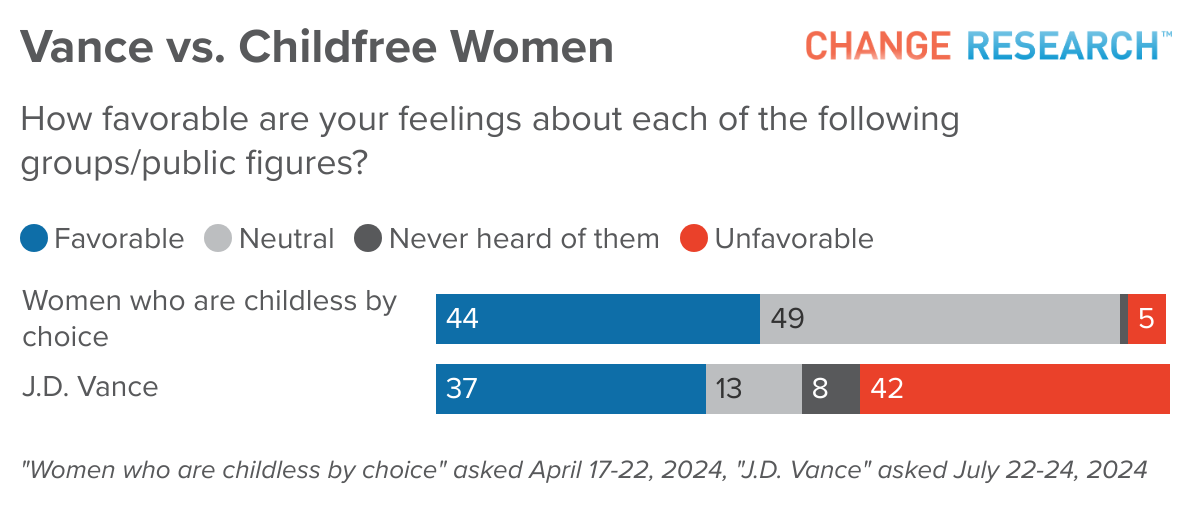Claws and Effect
J. D. Vance's Cat-astrophe
Donald Trump’s Vice Presidential running mate, J. D. Vance, has continuously referred to women without children in a degrading and demeaning tone. He has openly referred to them as “childless sociopaths,” “less mentally stable,” “mostly deranged,” “psychotic,” and “miserable.” He has made claims that they “don’t have a direct stake [in the future] of this country...” This begs the question, are Vance’s comments representative of his party? Do conservative Americans hold some kind of hostility toward women who either choose not to have children (or cannot have them)? In short: no.
In our recent poll on women’s rights, we asked voters their impression of women who are childless by choice. Just 5% of Americans have an “unfavorable” impression of women who choose not to have children. Approximately half of voters have a “neutral” impression of women who are childless by choice, while 44% have a favorable impression. Our research has found that more men (18%) than women (15%) plan to remain child-free, but of course, they are not the target of J. D. Vance’s ire.
Impressions of J.D. Vance are far worse than the impressions of the women he attacks. Americans (42%) have an unfavorable impression of J.D. Vance, while 37% have a favorable view of him. His unfavorables have increased sharply since June (+15).
J.D. Vance’s attacks on childless women, however, do allude to the most common perceptions that Democrats and Independents already have of Republicans. When asked, “What kind of lifestyle or American Dream do you think Republicans are fighting for?” Democrats and Independents choose elements of a 1950s vision:
For Men to be primary income earners
People to have children
Women to have more children
Women to stay at home once they have children
J.D. Vance’s attempt to contextualize his statement (by only apologizing to cats, and not the childless cat ladies) reframed the issue as instead about the future of American children and Democrats’ “apparent” anti-family political platform.
This wedge has more political wisdom: Democrats and Republicans have vastly different impressions of when America has been best for men, women, children, and parenting.
Republicans draw clear delineations between when they believe it has been best to be an American woman, or best for women’s role in the economy, in women’s rights, and several other attributes tested. Nearly half (47%) of Republicans crave a pre-1970s America as the best time in history for women’s and men’s roles in the family.
When asked, “In what ways is raising children worse today than in the past?” Republican voters, like Democrats, frequently acknowledge challenges related to the cost of living, technology, and social media. They are less likely to mention issues related to gun violence and more likely to refer to government and school interference and that people don’t know how to raise or discipline their children anymore.
A plurality of Democrats believe this decade has been the best for American women’s role in the economy and the family. A plurality also believes that the 2010s was the best decade for women’s rights, possibly due to the fall of Roe v. Wade in the 2020s.
J. D. Vance would do well to consider that the important thing to remember about wedge issues is that they work both ways—they can motivate voters on both sides of an issue. Democrats have a very different ideal when it comes to supporting families and their structures. There is a need for Democrats to deploy effective messaging that addresses the challenges families are facing while recognizing the goals that forward-thinking leaders and voters are working toward.
Vice President Kamala Harris’ pitch to American voters pushes back on the conservative effort to turn back the hands of time on civil liberties. Since she entered the 2024 Presidential race, she has echoed the phrase, “We are not going back.” A sharp contrast to former President Donald Trump’s “Make America Great Again,” and the Project 2025 proposal.
Nostalgia has become a dominant theme in American politics for nearly a decade, appealing to voters across the political spectrum. In this webinar, we use data to interpret what Americans perceive as the best version of America and how the “American Dream” is defined moving forward.
There is a reason why conservatives are fixated on culture wars, and why they resonate with their voters. Democrats tend to believe that we are (or were recently) living in the best moment in time when it comes to key issues, while the majority of Republicans crave a pre-1970s existence.
Republicans' and Democrats' attitudes vary considerably on:
The Economy
Race Relations
Safety and Gun Violence
Gender roles and the family
Women’s rights and abortion
Notably though, all Americans, regardless of generation, desire to remove work from the center of their lives. There is a growing interest in spending more of life with friends and family and engaging in leisure. Join us, on Wednesday, August 14th at noon ET as we look at America’s past and consider America’s future.






